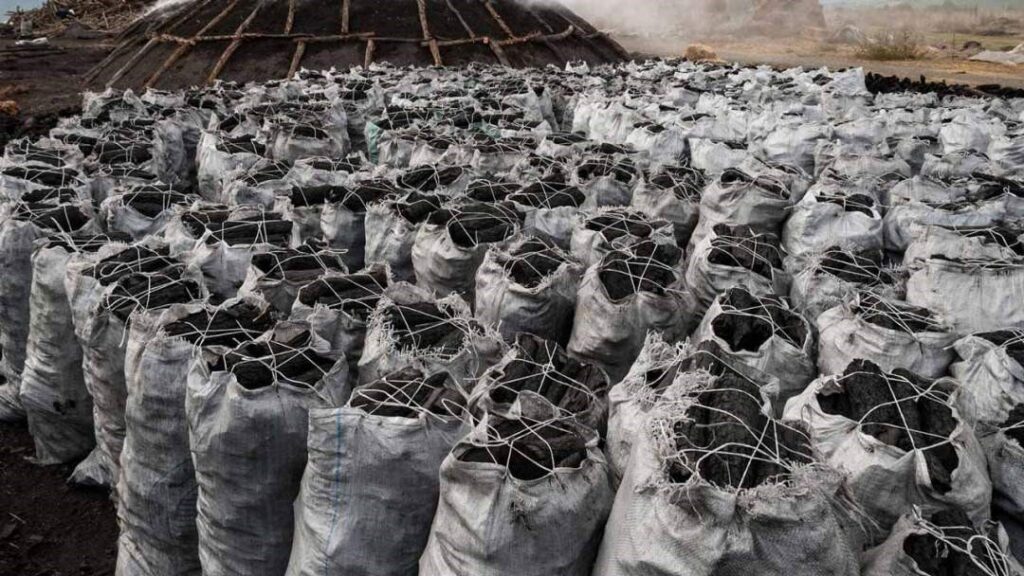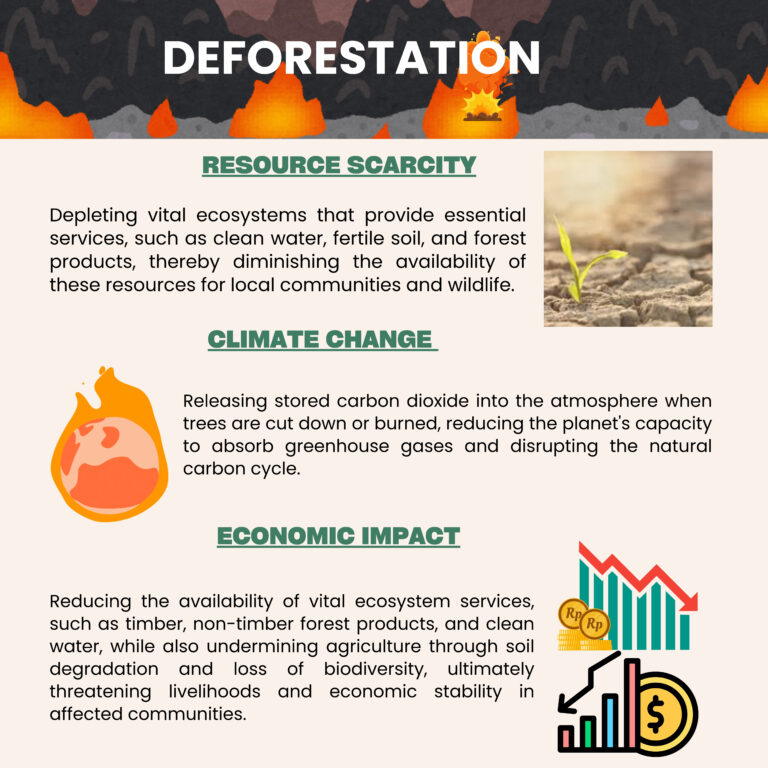
KEY TAKEAWAYS
- Nigeria’s forests host an impressive array of biodiversity.
- Deforestation and biodiversity loss are deeply interlinked, with one exacerbating the other. As forests degrade, biodiversity declines, weakening natural resilience to climate change, and reducing crucial ecological services.
- Drivers of deforestation in Nigeria include agricultural expansion, logging (both legal and illegal), and urbanization.
- The projected consequences of deforestation in Nigeria are vital and must be eluded.
- Effective remediation requires strengthened policy enforcement, sustainable agricultural practices, alternative livelihoods, and community-driven conservation efforts.
INTRODUCTION
The National Strategy for Combating Wildlife and Forest Crime in Nigeria (2022-2026) underscores the critical importance of biodiversity preservation. Nigeria’s rich ecosystems support many species, including 864 species of birds, 117 amphibians, 203 reptiles, over 775 species of fish, 285 mammals, over 4,715 vascular plants, and probably many more unrecorded species (10).
The overwhelming and escalating deforestation in Nigeria, threatens its biodiversity, tropical forests, and the rest of the many ecosystems and natural habitats. A key feature of Nigeria’s ecology is its large and burgeoning human population and the increasing pressure this population growth is putting upon the natural environment.
THE SYNERGY OF BIODIVERSITY AND DEFORESTATION.
The synergy between biodiversity and deforestation reflects an intricate, interdependent relationship with profound ecological implications. Biodiversity thrives in well-preserved forest ecosystems, where species diversity enhances ecological balance and resilience to environmental changes. However, deforestation disrupts these ecosystems, reducing biodiversity by destroying habitats, fragmenting populations, and altering natural processes. This loss of biodiversity, in turn, weakens the structure of forest ecosystems, reducing their ability to provide essential services like pollination, water regulation, climate regulation, and soil fertility (4). As species vanish, ecosystems become more vulnerable to invasive species and climate shifts, creating a feedback loop that accelerates forest degradation (8). Understanding this synergy highlights the urgent need for conservation efforts to protect biodiversity, which strengthens forest resilience and mitigates the long-term impacts of deforestation on both local and global ecological and economic systems. Protecting biodiversity is therefore essential not only for environmental integrity but also for sustaining the resources and processes on which human life depends.

UNDERSTANDING THE INDELIBLE DEFORESTATION IN NIGERIA
Deforestation has a severe impact on Nigeria’s biodiversity, leading to habitat loss, species extinction, and ecosystem imbalance. Forest ecosystems like the Cross River Rainforest host a unique range of species, including endangered animals such as the Cross River gorilla and Nigeria-Cameroon chimpanzee (10). As forests are cleared, these species lose critical habitats, resulting in population declines and increased vulnerability to extinction. (8).
Deforestation in Nigeria is driven primarily by:
- Agricultural expansion: Smallholder farming and commercial plantations are major causes, accounting for extensive forest loss as the community’s clear land for food production and export crops like Palm oil and Cocoa. (5)
- Logging: The legal and illegal logging industry is driven by local demands for timber and firewood and international market demands. In Nigeria, firewood is still widely used as a primary source of energy, particularly for cooking. This practice not only contributes significantly to deforestation but also impacts air quality, posing severe health risks like respiratory issues. Furthermore, collecting firewood puts additional strain on forest ecosystems, which are already vulnerable due to other deforestation drivers, making it a critical environmental and health concern. (8). The accentuation of illegality in logging activities in the forest belts of Edo and Ondo States is worrisome, as it contributes more to the continuous deforestation taking place in Nigeria. Additionally, the price of charcoal has inflated from ₦1,000 and ₦4,000 to ₦7,500 and ₦9,000 per bag, depending on the location, due to the removal of fuel scarcity. This has put pressure on low-income earners as they have to source illegal means of timbering to acquire firewood.

Image Source: https://charcoalmarket.com/charcoal-nigeria/
- Urbanization: The large and burgeoning human population and the increasing pressure this population growth is putting upon the natural environment causes rapid urbanization and infrastructure projects in Nigeria, and this promotes forest clearing and displacement. Urban sprawl is particularly high around cities like Lagos and Abuja, intensifying pressure on nearby forests (11).

Looking forward, if current deforestation trends continue, Nigeria may face severe ecological and economic repercussions. The loss of forest cover would exacerbate climate change effects by increasing carbon emissions and reducing natural carbon sinks, potentially intensifying droughts and extreme weather patterns (6). Biodiversity losses will likely impact agriculture, reducing crop pollination and soil fertility, and increasing vulnerability to pests, ultimately threatening food security and livelihoods. Many communities rely on forests for food, medicine, and fuel. Forest degradation results in decreased access to these resources, forcing people to adopt alternative, sometimes unsustainable practices. Furthermore, the decline in forest ecosystems may undermine Nigeria’s potential for ecotourism, reducing revenue from natural heritage sites and thereby inflating poverty. In the long term, these outcomes suggest a bleak future for biodiversity and underscore the need for urgent conservation actions to mitigate deforestation’s impacts.
CHALLENGES AND REMEDIATION MEASURES
Economically, sustainable forest management can support Nigeria’s ecotourism sector, providing jobs and generating revenue, while conserving resources essential for industries such as agriculture, medicine, and forestry. By halting deforestation, Nigeria can protect its rich biodiversity, support local economies, and build resilience to environmental challenges, ultimately fostering a healthier, more sustainable future.
However, the issue of frail policy enforcement and governance (illegal mining of timber), economic pressures and poverty (lack of job opportunities), and lack of awareness and education, thrive as a great challenge for the remediation of the deforestation impact in Nigeria. (3)
Although these challenges are of great concern, there are opportunities to remediate the deforestation impact on the Nigerian economy.
- Strengthening Policy and Enforcement Mechanisms: Developing robust legal frameworks, combined with adequate resources for enforcement, is crucial to controlling illegal logging and unsustainable land-use practices. Partnerships between the Nigerian government, NGOs, and international agencies can support policy-strengthening efforts and improve monitoring capabilities (2).
- Promoting Sustainable Agriculture and Alternative Livelihoods: Encouraging sustainable farming techniques, such as agroforestry, and providing alternative livelihoods for rural communities can reduce deforestation pressures. Programs that incentivize reforestation and community-based forest management can create economic benefits while conserving forests. (1)
- Education and Community Involvement: Increasing environmental awareness through community education and participation programs is vital for conservation. Engaging local communities in reforestation and forest management projects builds a sense of ownership and stewardship, leading to better conservation outcomes. (11). Schools and media campaigns can play a role in raising awareness about biodiversity’s value.

CONCLUSION AND CALL TO ACTION
Deforestation is not only a crisis for Nigeria’s natural heritage but a looming threat to its economy, food security, and resilience against climate change. The interdependence between Nigeria’s forests and its biodiversity highlights the urgency to act against deforestation, safeguarding natural ecosystems that sustain the economy and human health. Immediate action is crucial for reversing deforestation and fostering a sustainable future.
To secure a thriving future for Nigeria’s environment, economy, and communities, it is vital to support and actively participate in conservation efforts. Encourage sustainable practices, support community education, and call for stronger enforcement of deforestation policies. By taking action at individual, community, and governmental levels, we can protect Nigeria’s forests, preserve biodiversity, and build resilience for generations to come.
REFERENCES
- Adekunle, V. A., Olagoke, A. O., & Akindele, S. O. (2013). Tree species diversity and structure of a Nigerian strict nature reserve. Tropical Ecology, 54(3), 275-289.
- Agbelade, A. D., & Onyekwelu, J. C. (2020). Contributions of forest cover change to climate change in Nigeria. Forest Ecosystems, 7(1), 1-15.
- Agrawal, A., Chhatre, A., & Hardin, R. (2018). Changing governance and sustainable forest management in the forests of India and Nigeria. Environmental Science & Policy, 89, 123-131.
- Babalola, F. D., Odebiyi, J. A., & Onadeko, S. A. (2014). Conservation of biodiversity: An overview of forest and wildlife resources in Nigeria. OIDA International Journal of Sustainable Development, 7(2), 33-40.
- Chazdon, R. L., Peres, C. A., Dent, D., et al. (2009). The potential for species conservation in tropical secondary forests. Conservation Biology, 23(6), 1406-1417.
- FAO. (2020). Global Forest Resources Assessment 2020: Main report. Food and Agriculture Organization of the United Nations.
- IPCC. (2019). Climate Change and Land: Summary for Policymakers. Intergovernmental Panel on Climate Change.
- Kaimowitz, D., & Angelsen, A. (1998). Economic models of tropical deforestation: A review. CIFOR, 3-4.
- Laurance, W. F., Sayer, J., & Cassman, K. G. (2012). Agricultural expansion and its impacts on tropical nature. Trends in Ecology & Evolution, 27(3), 173-175.
- Mohan, J. (ed.) (2022) National strategy to combat wildlife and forest …, A Nigeria Free of Wildlife Crime. Available at: https://www.unodc.org/documents/nigeria//National_Strategy_to_Combat_Wildlife_and_Forest_Crime_in_Nigeria_2022-2026.pdf
- Oates, J. F., Bergl, R. A., & Linder, J. M. (2007). The Cross River gorilla: The most endangered gorilla subspecies. The Gorilla Journal, 34, 8-11.
- Ohwo, O., & Abotutu, A. (2015). Environmental impact of urbanization in Nigeria. British Journal of Applied Science & Technology, 9(3), 212-221.
- Olaniyi, O. A., Ogunwale, A. O., & Akinnifesi, T. A. (2018). Community-based biodiversity conservation approach for sustainable forest management in Nigeria. Journal of Environmental Science and Public Health, 2(4), 239-248.


